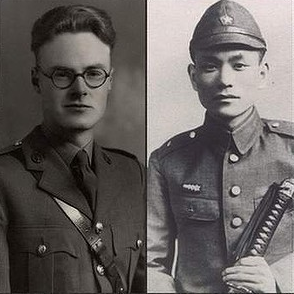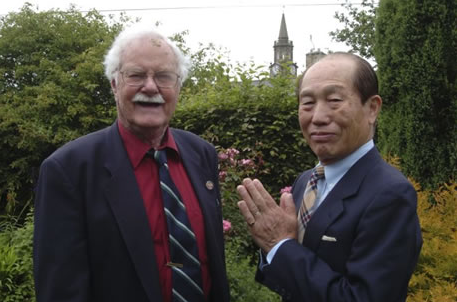I sometimes suffer from a painful condition. Shortly after an argument I always think of the words I should have said. But it is too late. I promise myself to use them for next time. I have no idea if Ambassador Keiichi Hayashi also has moments like that.
Paxo: Ambassador, these islands aren’t inhabited, why not just give them to the Chinese?
林 景一: Imagine if the Falklands had not been inhabited. Would Prime Minister Thatcher have given them to General Galtieri in 1982? Why not? Would that have been right? I think not.
Paxo: But is it really worth jeopardizing the security of that whole part of the world and possibly the world itself?
林 景一: It is not, and so that is certainly a question you should ask China. We have a system of international order. We have age old principles of self defence and sovereignty that everyone has to respect. We are defending this order in the face of aggression from China, so please ask them this question.
Paxo: Isn’t what is really happening here is that Japan is seeking to re-establish a military identity?
林 景一: No. In fact despite rising threats from North Korea and China, Japan is still holding firmly to its identity as a peaceful democratic nation. We are fortunate to have like-minded friends and allies like the United States and Britain to help us defend these principles. We left our military identity behind after WWII and placed our security in the trust of the principles of the United Nations. Japan learned the hard way that a military identity, a totalitarian political order, and a militaristic foreign policy courts national disaster. We will never repeat this mistake. But we will also work to warn other nations not to make this mistake, because that that way lies disaster.
Paxo: It’s true you are seeking constitutional reform, though?
林 景一: There is a debate in Japan about our constitution, you are right. Our system is a parliamentary democracy, just like here, because it was modeled on the Westminster system. So ideas will be proposed, openly debated and decided by the representatives of the will of the people. And I can assure you that the Japanese people remain as opposed to a military identity for their country now as they have been for the past half century or more. Sorry but if I may add, your question changes the subject. The debate in Japan on the Constitution is focused mainly on whether we should include an amendment to explicitly allow for collective self-defence and acknowledge the existance of a military capability for defending the country. However, that would not change the situation with these islands, which is one where Japan is exercising the right of individual self-defence, which is basic to all nations. So if you don’t mind my saying so, this issue of amending the constitution may be a bit beside the point.
Paxo: Why does PM Abe want to remove the inhibition on settling disputes by force of arms?
林 景一: Settling disputes by force or arms is always – for all countries – a last resort. This is an accepted principle of just war going back centuries, but also of our UN Charter today. As I said just now, if Japan faces an armed attack, then we have the right, indeed the obligation to defend ourselves. Now on the Japanese Constitution, we remain as committed as ever to settling disputes by peaceful means – no-one in Japan is advocating anything different. But I am afraid I have to say that the question of constitutional reform really is un-connected to our problems with China over these islands. That is a straightforward matter of defending our national sovereignty against the threat of armed attack.
Paxo: Do you think it helps things by using childish abuse comparing people to Voldermort for example?
林 景一: I was responding to the metaphor suggested by the Chinese Ambassador, so you perhaps can ask him this question.
Paxo: But you say there is nothing to talk about. How can there be dialogue when you consider there is nothing to discuss?
林 景一: We are ready to sit down and talk any time. We have had a dialogue with China and with Korea and with Russia about such things for some time, so it is unfortunate that now China is refusing to discuss with our Prime Minister. Why does China refuse? The reason they are giving – our Prime Minister’s visit to a war memorial shrine – is very difficult to accept. During the Cold War, when we were both feeling threatened by the USSR, China never raised such objections. This makes people wonder if perhaps it is a kind of pretext. Prime Minister Abe is of course mindful of how the shrine has become a political and diplomatic issue. Which is why he made a point of explaining his motives on the occasion of hist latest visit: a profound recognition that Japan must never wage a war again. A conviction based on the severe remorse for the past. A renewed determination before the souls of the war dead to firmly uphold the pledge never to wage a war again.
Paxo: OK Ambassador. Thank you very much.



